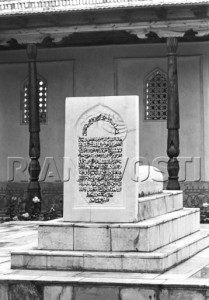| Quick Navigation |
Silsilah
-
1. Muhammed Rasuul Allah e
-
2. Hazrat Abu Bakr as-Siddiq t
-
3. Hazrat Salman al-Farsi t
-
4. Hazrat Qassim h
-
5. Hazrat Jaafar Saddiq h
-
6. Hazrat Abu ba-Yazid Bostami h
-
7. Hazrat Abul Hassan Kharqani h
-
8. Hazrat Abu Ali Farmadi h
-
9. Hazrat Yusuf Hamadani h
-
10. Hazrat Abdul Khaliq Ghujdawani h
-
11. Hazrat Arif Reogri h
-
12. Hazrat Mahmood Anjir Faghnawi h
-
13. Hazrat Azizan Ali Ramitani h
-
14. Hazrat Muhammed Baba Samasi h
-
15. Hazrat Syed Ameer Kulal h
-
16. Hazrat Syed Bahauddin Naqshband h
-
17. Hazrat Ala'uddin Attaar h
-
18. Hazrat Yaqub Charkhi h
-
19. Hazrat Ubaydullah Ahraar h
-
20. Hazrat Muhammed Zahid Wali h
-
21. Hazrat Darwaish Muhammed h
-
22. Hazrat Khwajgii Amkingi h
-
23. Hazrat Raz'uddin Baqi bi-l-Lah h
-
24. Hazrat Ahmed Sarhindi Faruqi h
-
25. Hazrat Muhammed Masum h
-
26. Hazrat Saifuddin h
-
27. Hzrt Syed Nur Muhammed Badawani h
-
28. Hazrat Mirza Jan-i Janaa Mazhar h
-
29. Hazrat Shah Ghulam Ali h
-
30. Hazrat Shah Abu Saeed h
-
31. Hazrat Shah Ahmed Saeed h
-
32. Hazrat Shah Muhammed Umar h
-
33. Hazrat Shah Abul Khair Dehlvi h
-
34. Hazrat Bilal Faruqi h
-
34. Hazrat Zaid Abul Hassan Faruqi h
-
34. Hazrat Salim al-Faruqi h
-
34. Hazrat Shah Abdul Aziz Kuhlnavi h
-
35. Hzrat Syed Mahmood Hassan Rizvi h
-
35. Hazrat Khwaja Masoom h
-
35. Hazrat Abdul Rahim h
-
36. Hazrat Nisar Ahmed h
18. Hazrat Yaqub Charkhi h
|
[ to be translated in English ] |
دامِن صبرورذا چوٹنے نہ پاۓ ہاتھہ سے |
| [ to be translated in English ] | حضرت یعقوب چرخی ذی حیا کے واسطے |
- Extracts from Sijra-ay-Tayyiba - Shiekh Syed Mahmood Hassan Rizvi (Rehmat'ullah Alaiyh)
حضرت سیدمیاں محمّد حسن محمود رضوی نقشبدی مجددی عزیزی رحمتاالله علیه
Translation to English by Anwar-un-Nabi [please forgive any mistakes]
- Details
- Written by Anwar-un-Nabi (انوارالنبی ابن نسار احمد)
The great Naqshbandi shaykh and student of Khwaja Baha al-Din Naqshband, Hazrat Mawlana Yaqub Charkhi (762-851 AH) was not only a Sufi master but also a reputed Islamic scholar.
His full name was Yaqūb bin Usmān bin Mahmūd Ghaznavi Charkhi. He was born around 762 AH (1360/61) and passed away to the eternal world on Saturday 5 Safar 851 AH (22 April 1447). His shrine, according to some research scholars, lies 5 kilometers West of Dushanbe the capital of Tajikistan.
- Details
- Written by Anwar-un-Nabi (انوارالنبی ابن نسار احمد)
Shaykh Yaqub al-Charkhi
May Allah Sanctify His Soul"I have known God and I see none other than Him
So that the 'Other' inus is shut out.
Since I realized unity, I no longer fear separation;
This day I have arrived and am united."Anonymous.
Scholar of Saints and Saint of Scholars
He appeared among human beings dressed in the two knowledges, the exernal and the internal. His conduct and character were so refined that he reflected the attributes of God to all people. He revived spirituality within Divine Law and he revived Divine Law (sharica) within spirituality. People followed him because his way was the best, for he had inherited Knowledge of the Unseen from the Prophet (s).
